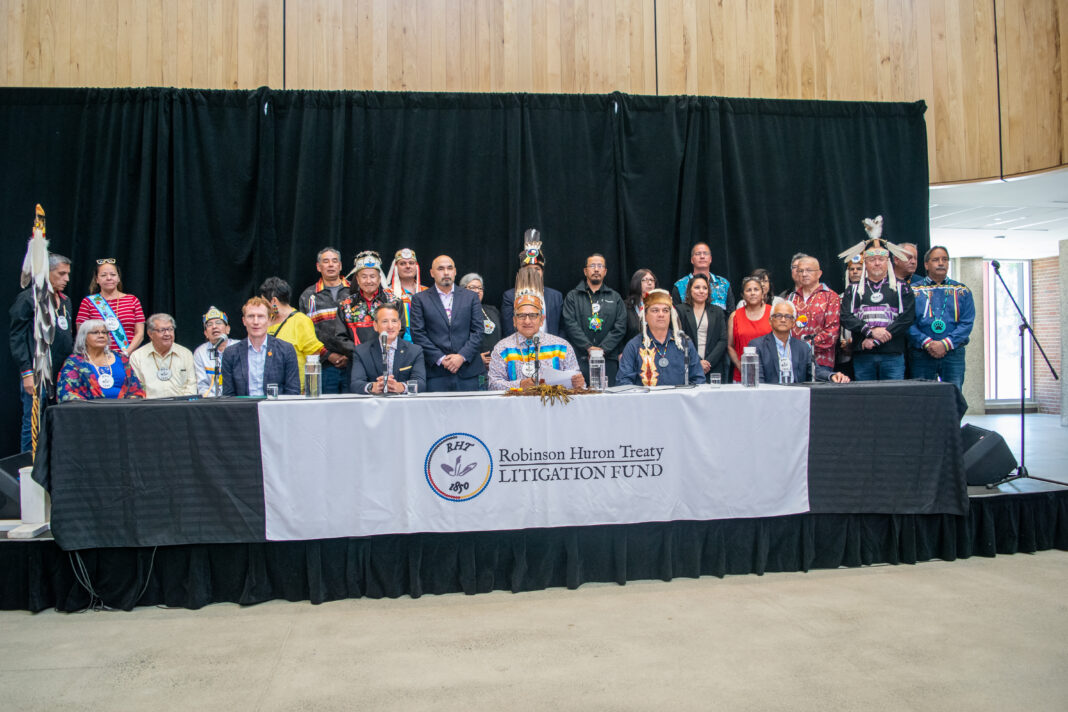ROBINSON-HURON—The governments of Canada and Ontario have signed the Robinson- Huron Treaty annuities agree, the next step in this process.
“It is very good news,” stated Chief Angus Toulouse of the Sagamok Anishnawbek when contacted last Wednesday. “All 21 Robinson-Huron Treaty First Nations are looking forward to completion of the (annuities case) and the process of negotiating and working toward a new annuity.”
“The Robinson-Huron Treaty Litigation Fund settlement agreement has been signed by all First Nations leadership, and now both the Ontario and Canada governments have signed off on the agreement,” said Chief Toulouse, noting the agreement must have been signed off by the governments in the past week or so.
On January 3, the Robinson—Huron Chiefs and trustees met and signed the settlement agreement, a RHTLF release said. “Meanwhile, your chief and council have begun or are continuing to hold local engagement sessions to provide information and make decisions on final disbursement at a local level. Some communities are in the process of their sessions, while other communities have completed their community engagement sessions.
“Yes, it is very good news,” stated Chief Toulouse. “Many of us have been dealing with this matter for quite some time.”
Chief Toulouse said, “There is one additional step that needs to be taken. The agreement needs to go in front of the Ontario Superior Court Justice to release an order that indicates the case has been concluded.” The case had been put in front of the court in 2012 by the Robinson-Huron First Nations for past compensation.
“We hope that this will be in front of the Ontario Superior Court Justice in the month of February,” continued Chief Toulouse.
Chief Toulouse explained after the Ontario Superior Court Justice has provided the order, “then it will be approximately 60 days for the order of the funds flowing to the Robinson Huron Treaty Litigation Fund, then on to each of the communities.”
“Then the next challenge is negotiating with and coming to an agreement with the governments on an annuity rate. Hopefully we will see something concluded as quick as possible,” continued Chief Toulouse.
The Robinson-Huron Treaty was originally signed in 1850 between the British Crown and 21 First Nations living on Manitoulin Island and along the shores of Lake Huron. While the Crown promised to fairly compensate these Indigenous communities for use of their land, which led to the extraction of valuable resources such as nickel, cooper, uranium, timber and fish, annuity rates have remained the same since 1875.
This issue was brought before the courts in 2012 through the formation of the Robinson-Huron Treaty Litigation Fund in 2012.
Ontario’s Superior Court of Justice ruled in 2018 that the Crown had an obligation under the original 1850 treaty to increase annuities as wealth generated from the land increased, over time.
In June of last year, the 21 First Nations reached a proposed settlement with the governments, with Ontario and the federal government agreeing to pay around $10 billion for past losses.
The province has appealed some parts of the court decision, both in the Ontario Court of Appeal in 2021 the Supreme Court of Canada.
In November, the province argued that increases to the annuity should be at the discretion of the Crown and not the courts.
It is anticipated the Supreme Court will reach a decision on this issue by the end of the year. However, the ruling will not have an impact on the $10 billion Robinson-Huron Treaty settlement.
The 21 First Nations include all those on Manitoulin Island including Aundeck Omni Kaning, M’Chigeeng First Nation, Sheguiandah First Nation, Sheshegwaning First Nation, Whitefish River First Nation, Wiikwemkoong Unceded Territory and Zhiibaahaasing First Nation.





